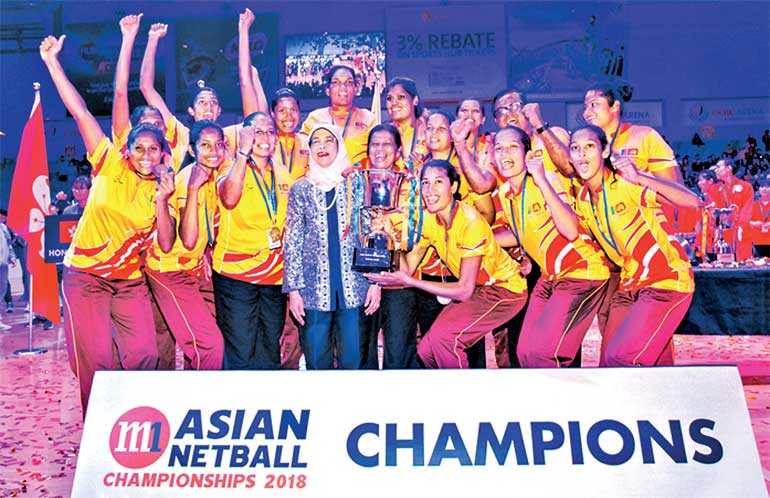Sunday Feb 22, 2026
Sunday Feb 22, 2026
Wednesday, 6 February 2019 00:10 - - {{hitsCtrl.values.hits}}
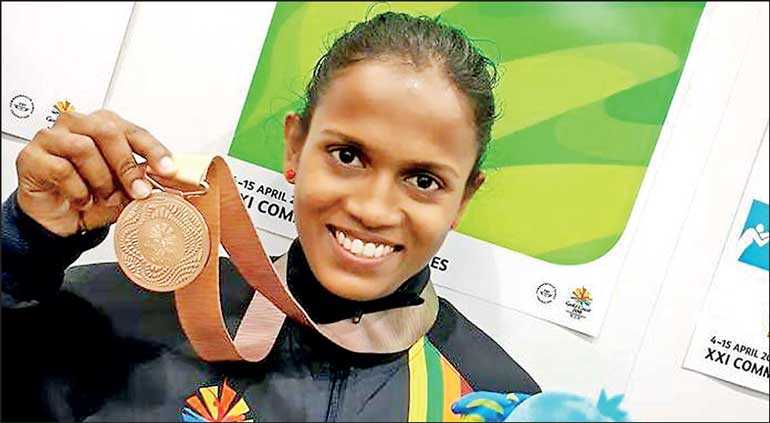
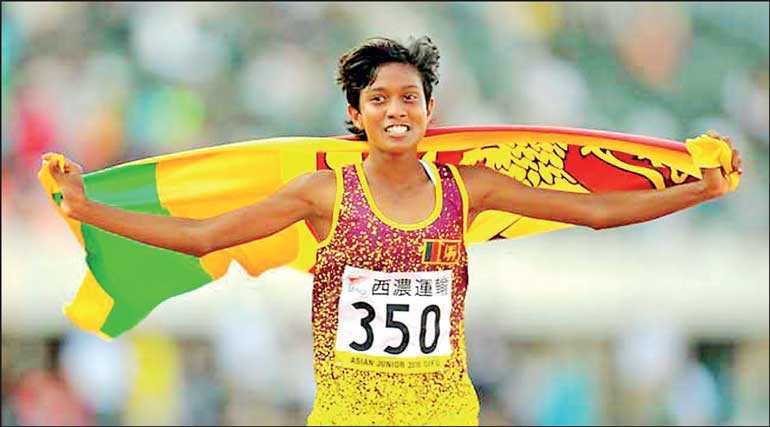
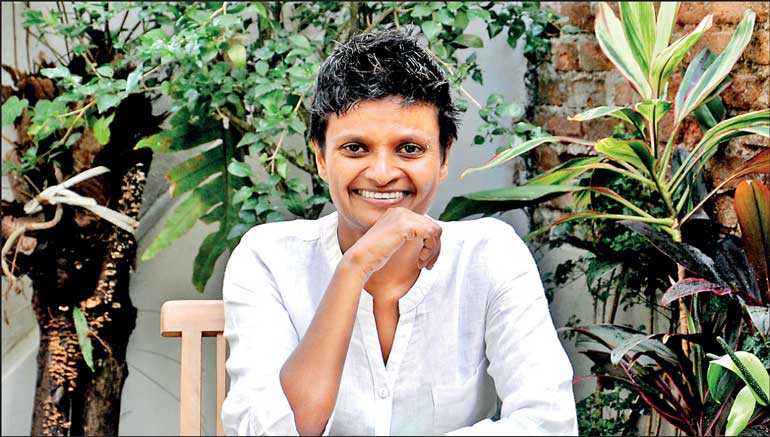
As we complete 71 years of independence and look back on 2018 – it is unmistakable – once again women and girls from Sri Lanka have emerged triumphant in sport! 
It was heartening to see a series of news headlines, social media posts and videos celebrating women in professional sports and their victories late last year, but the comments and conversations around these posts left Cat’s Eye with no doubt that more needs to be said on the matter, before it can be laid to rest.
Let’s see if we can say this all in one breath:
In December 2018, Hansani Gomes won Gold in the 49-kilo category at the Senior National Weightlifting Championships in Sri Lanka, as well as the honour of ‘Best Woman Weightlifter’ in the whole tournament. In October 2018, Parami Wasanthi made headlines and the country proud by winning a Bronze medal in the Women’s 2000 metre steeplechase at the Youth Olympic Games – a first medal at these games for Sri Lanka. Earlier the same year, Sri Lanka Women’s Netball Team were crowned Asian Netball Champions and star shooter Tharjini Sivalingam was named Player of the Series. In 2016, Jayanthi Kuru-Utumpala became the first Sri Lankan – man or woman – to summit Mount Everest – the tallest mountain in the world. And they are certainly in the company of other great Sri Lankan women athletes – Nirmala Dissanayake, Susanthika Jayasinghe, Sriyani Kulawansa, Damayanthi Dharsha – among many others past and present.
The achievements by Sri Lankan women in sports needs to be celebrated much more, because in spite of all we do to prevent them from succeeding, they are playing sport and doing it so well.
Misogyny and sexual harassment
In spite of all these successes however, women in Sri Lanka continue to deal with misogyny – which is the ingrained prejudice and contempt against women – a travesty that should not be tolerated anymore.
For example, a Sri Lankan advertising agency congratulated Parami for ‘running like a boy,’ the assumption being that she couldn’t have won by running like a girl, which is who she is. Despite the outpouring of protest and anger, the agency has so far not seen it fit to either apologise or make a correction. (Following in the footsteps of another company that used a barrel to body shame women into joining an exclusive gym – these advertising agencies in Sri Lanka are more likely to win the best misogynist category than for any original ideas at this rate)
In the aftermath of her now famous climb, amidst the congratulations, Jayanthi was also told by some men that her achievement had ‘emasculated men’ – supposedly depriving them of their ‘manliness’ or making them weaker somehow. It is also often assumed she was the first woman and not the first Sri Lankan to have climbed Everest – inconceivable to some that she could have reached the summit before a man. (Booffftttt…. That is the sound of some minds being blown – yes, still happens)
Moreover, allegations of sexual harassment against women athletes have been made in the past and continue to date.
Susanthika’s allegations of sexual harassment by Government officials and the slander she faced by officials and in the media in 1997 and after her Olympic win in 2000 have been well documented. These included derogatory comments about her physical appearance. 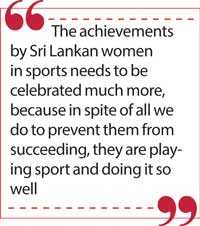
In 2015, Sri Lanka cricket was rocked by scandal when allegations were made that women cricketers were compelled to perform sexual favours for officials to earn or keep their place in the national side. Just over a year ago in 2017, a senior official of Sri Lanka Cricket was taken to court by a female employee for alleged sexual misconduct.
No women at most decision-making levels
Governing boards of several sports in Sri Lanka are no exceptions to the ingrained misogyny, with few to no women at most decision-making levels. A woman member of the Royal Colombo Golf Club filed a fundamental rights petition in 2013 against the Club to demand equal rights and treatment for women – allowing them to become ‘full-members’ with equal voting rights at General Meetings and Special General Meetings.
Five years later this case is still ongoing. Cat’s Eye took a quick look at the governing boards and councils of several national sports bodies and the current status is quite telling. All 23-members on the Executive Committee for cricket in Sri Lanka are men, despite a women’s cricket team that takes part in international tournaments. There are also no female coaches for cricket at district and provincial level.
All members of the General Committee of the Royal Colombo Golf Club are men, again, despite the achievements of some renowned women golfers. The Sri Lanka Rugby Council has one woman on its 17-member Board; The Sri Lanka Basketball Federation has one woman on its 12-member Board. It is only the Netball Federation which stands out with its majority women Board.
Negative, unsafe environment
Despite all the achievements by Sri Lankan sportswomen, the continued misogyny in governing structures, benefits and support, clothing, media coverage and general attitudes, disrespects great sports women. It creates a negative, even unsafe environment for women and girls to join sports, play, succeed and contribute.
When we change the environment for women and girls in sports, we create an environment that is healthier, more just, and further develops the sport in the country. For example, while men are currently failing abysmally at cricket, there is no effort to strengthen and invest in women’s potential. Equal opportunities for women will only increase Sri Lanka’s chances of doing better in the world of sport!
Cat’s Eye finds it ludicrous that so many find it difficult to accept a sportswoman’s body for its own ability and strength. Instead, there is an urge to police it, ridicule it, force it to be dressed in ways pleasing to mostly male governing boards and spectators.
There is a strong, misogynist inability to accept that a female body can achieve great feats, evident in the assumption that among the highest compliments a sports woman can be given is that she plays like a boy! Even the few achievements highlighted in this column show that playing like a girl is something to be proud of. Just being recognised as a strong sportsperson in your own right – woman or man – is even better.
If anyone still harbours the illusion that women’s physical and mental fitness is inherently not as strong or as capable as a man’s, Cat’s Eye would urge you to look up ‘Battle of the Sexes’ – the legendary tennis match between Billie Jean King and Bobby Riggs in 1973, that took on and settled this most basic of stereotypes.
A leading national level woman athlete in Sri Lanka speaking to Cat’s Eye, reflected on an incident in the 1960s, when rotten eggs were thrown at her team because they dared to have a female coach. If you think times have changed now, they have and they haven’t.
It is true that for some sports at least, women’s teams get more support than before, though still not comparable to men’s teams. Women are also creating spaces to play sports recreationally or at an amateur level with other women and men.
Impetus for change
Athletes speaking to Cat’s Eye also say more women are speaking out about inequalities and discrimination now, creating an impetus for change. Global events and fiascos are driving and shaping these conversations too.
For example, the French tennis player Alize Cornet was penalised for briefly removing her t-shirt on the court of the US Open – something male players do regularly. This was widely protested and later overturned.
Serena Williams was not allowed to wear her full-body suit while playing, on the dubious logic of the President of the French Tennis Federation that it ‘disrespected the game and place.’ This despite her being clear that the suit was important to help with blood clots that threatened her life, after her pregnancy. These are penalties for covering up and not covering up – women can’t seem to win on some fronts, despite the many victories on the courts!
Until as late as 2012 the International Federation of Association Football (FIFA) officially banned the wearing of head covers for women players, effectively sidelining Muslim female athletes, which has now been lifted. It was only as recently as 2017 that The International Basketball Federation (FIBA) allowed female basketball players to wear head coverings and Nike produced an athletic head cover for Muslim women athletes.
Level the playing field
For women to do even better at sports in Sri Lanka, we need to give them at least the kind of support male players and men’s teams usually get, and create positive, safe environment for them to succeed. To really level the playing field (after years of gross injustice), much more needs to be done in support of women and girls in sports.
What are the consequences of not doing so? For one, we will never have Sri Lankans really shine on the world stage in sport. Let’s face it, when we shut out a whole section of society from fairly benefiting from resources that they already contribute towards, it is just criminal.
As time passes it will continue to be tougher to produce professional players and many people will continue to write women off – unfairly – as being inferior sportspersons. That lift-up and support is needed from a young age so that girls play more sports in schools and continue to do so after they leave school. This would raise the overall training and standards for women’s sport enabling them to compete more effectively at international levels.
While women continue to fight and defy expectations and accomplish great things, the public also needs to play its part in pushing for positive change. For people engaged in casual sports for instance, think about your behaviour on the pitch, court, or in your gym.
Here’s a helpful guide – do you think girls playing well are ‘playing like boys?’ Do you ever avoid throwing/passing to women in team sports, assuming they just cannot throw as well, play as well as boys/men? Do you defend sexist comments or behaviour, laughing it off as ‘boys will be boys?’
Do you think women need a ‘handicap advantage’ because they are not as capable as men at sports? Do you control, mock or ogle at what sports-women wear for comfort and ease of playing? If you answered yes to any of these, you are a part of the problem. But the good news is, it’s never too late for you to make a change and create a healthier environment for women in sport. Every change counts.
